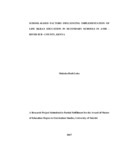| dc.contributor.author | Mukeku, Ruth, L | |
| dc.date.accessioned | 2017-12-04T07:38:07Z | |
| dc.date.available | 2017-12-04T07:38:07Z | |
| dc.date.issued | 2017 | |
| dc.identifier.uri | http://hdl.handle.net/11295/101513 | |
| dc.description.abstract | The purpose of the study was to investigate school based factors influencing the implementation of life skills education curriculum in public secondary schools in Athi River Sub-County, Kenya. Four research objectives were set to guide the study. Research objective one sought to assess the availability and adequacy of teaching and learning resources in implementation of life skills in public secondary schools; research objective two sought to analyze the appropriateness of methodologies used in the implementation of life skills education in public secondary schools; research objective three aimed at establishing whether teachers were given adequate in-service training for implementation life skills education in public secondary schools whereas research objective four sought to analyze the supervision by principals on implementation of life skills education in public secondary schools. The study adopted the descriptive research design to find out school based factors influencing the implementation of life skills education curriculum. The sample size comprised of 10 principals, 30 teachers and 400 students. The study used questionnaires and interview schedules for data collection. The researcher visited the selected schools and the questionnaires were administered to the respondents with the help of the school authority. The respondents were assured of confidentiality. The researcher then collected the questionnaires after they filled them as they were filled as the researcher waited. The collected data was thoroughly examined and checked for completeness and comprehensibility. The data was analyzed quantitatively and qualitatively. The study realized 93 percent response rate that was deemed very satisfactory for the purpose of the study. Findings on availability and adequacy of teaching and learning resources on the implementation of LSE revealed that inadequate resources hampered effective implementation of LSE. Research findings also showed that teaching methodologies influenced implementation of life skills education. Discussions and storytelling were preferred by the majority of the teachers. Based on the findings, it was concluded that teaching and learning resources affected effective LSE implementation. Based on the study, it was recommended that head teachers should ensure that time allocated to LSE in their schools is in accordance with the guidelines provided by KICD. The principals should supervise teachers to ensure that LSE is taught. This study further recommended that the government, through the Ministry of Education, should enhance training for teachers in LSE. Based on the findings, it was suggested that LSE be made an examinable subject in order for teachers to treat it seriously. The study recommended that further study be undertaken in other districts in the Republic of Kenya to establish implementation of LSE. | en_US |
| dc.language.iso | en | en_US |
| dc.publisher | University of Nairobi | en_US |
| dc.rights | Attribution-NonCommercial-NoDerivs 3.0 United States | * |
| dc.rights.uri | http://creativecommons.org/licenses/by-nc-nd/3.0/us/ | * |
| dc.subject | School-based Factors Influencing Implementation of Life Skills Education in Secondary Schools in Athi – River Sub - County, Kenya | en_US |
| dc.title | School-based Factors Influencing Implementation of Life Skills Education in Secondary Schools in Athi – River Sub - County, Kenya | en_US |
| dc.type | Thesis | en_US |



